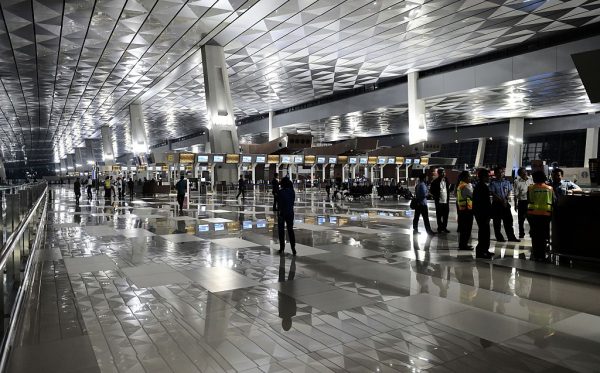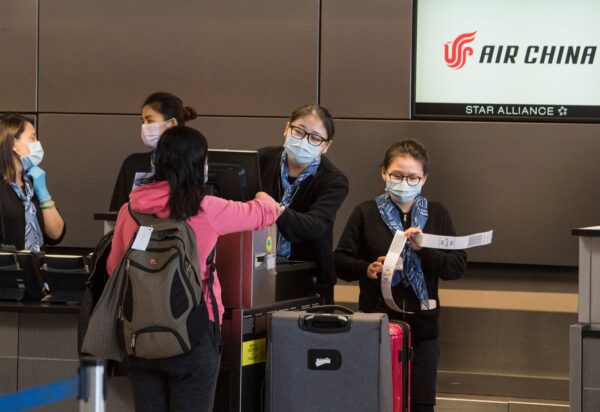Following a surge of COVID-19 cases in Indonesia, reportedly caused by the Delta variant that originated in India, the Chinese regime is attempting to block expats from returning to China.
Many people in Indonesia have been inoculated with Chinese-made vaccines but have still become infected with the CCP (Chinese Communist Party) virus, which causes COVID-19.
After the Indonesian government announced stricter restrictions, the Chinese embassy in the country tightened its rules to prevent Chinese expats from returning home. A large number of flights to China have been cancelled, causing more Chinese citizens to become stranded in the COVID-19 stricken country.
One Chinese man, who was in Indonesia for business, has revealed how difficult his journey back to China was.
Zhang Liang (a pseudonym) is the director of an electrical appliance company in Foshan, Guangdong Province. He told the Chinese Epoch Times that he went to Indonesia on June 12 for a three-day business trip.
However, he was sent to a five-day quarantine in a hotel right after he got off the plane in Indonesia. He rebooked his return flight to China for June 22 to Nanning, Guangxi Province.
According to Zhang, it’s now required that two days before returning to China, people have to go to two hospitals designated by the airline for double virus testing. If the results meet requirements, they need to upload them to the Chinese embassy’s website and submit various required information to obtain a green health QR code before boarding any flight to China.
Zhang was tested on June 20 and uploaded the results, applying for a green health code on June 21.
“Despite me submitting all the materials, I still received a red code, meaning that I could not return China,” Zhang said.
On June 22, Zhang called the Chinese embassy and got a response telling him that he must be quarantined in Indonesia for 14 days before he can return to China. Then he had to change his flight ticket to June 29.
On June 27, he did the double testing again, and got qualified results on June 28. However, when he applied for the green health code, he still got a red code. The reason given to him by the embassy was that he should be retested a week later.
Meanwhile, China has cancelled flights from Indonesia to China.
“On June 27 they cancelled three flights. As a result, more than 100 Chinese people were stranded at the airport that day. They were all miserable. The cancellation was so sudden. I was panicked at the time,” Zhang said.
Zhang called the Chinese embassy again, asking why he could not return to China. The answer provided by the embassy was that due to the COVID-19 surge in Indonesia, the embassy had tightened the policy for Chinese expats to return.

Out of caution, Zhang rebooked on two flights: one for Nanning on July 6 and the other for Fuzhou on July 8. In case one of the flights was cancelled, he could still get on the other one. He finally boarded the plane on July 6 and is currently in a 21-day quarantine at a hotel in Nanning.
He said that after returning to Foshan from Nanning, he would have to undergo isolation at home for seven days. It will be August when he can return to work normally. The three-day business trip took him two months to return to normal life. The flights and quarantines cost 46,000 yuan ($7,600). Luckily for him, it was paid for by his company, he said.
Zhang also revealed that the flight he took on July 6 to China turned out to be the last one. From July 8, all flights back to China have been temporarily halted. It is unknown when they will resume. “The Chinese people stranded over there have little hope to come back home,” he said.
Despite the CCP virus originating in Wuhan, the communist regime has attempted to shift any blame for the outbreak, instead now blaming travelers for bringing the virus variants into China.
During the outbreak in Wuhan last year and in India in late April this year, other countries were attempting to help their citizens to return home. By contrast, China took measures to prevent Chinese expats and students studying abroad from returning to China.

The Chinese embassy in the United States published the CCP’s policy and a lengthy article to explain it on its official website in Chinese, calling on overseas Chinese not to go back to China. It says “do not travel unless essential or urgent,” and to “build a steel great wall to prevent foreign import and domestic resurgence” of COVID-19. Chinese authorities also told expats to “think for the greater good for the country instead of personal well-being” on the website.
So far, Chinese vaccines have not been approved for use by the United States and the European Union. The Chinese vaccines are also excluded from the EU’s digital vaccination pass program. The regime has announced retaliation measures, denying entry for travelers who haven’t been inoculated with Chinese vaccines, not recognizing vaccination with non-Chinese vaccines. The measures have prevented many overseas Chinese citizens from returning to the country.
Gu Xiaohua and Li Jing contributed to the report.
 RSS Feed
RSS Feed













 July 12th, 2021
July 12th, 2021  Awake Goy
Awake Goy  Posted in
Posted in  Tags:
Tags: 
















